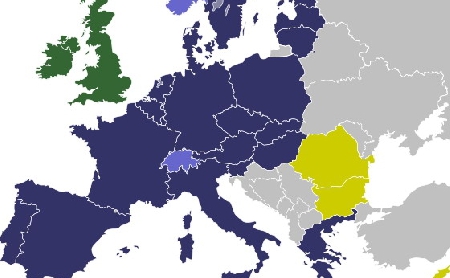Schengen accession – challenges, opportunities and the need for a plan
The end of the year 2023 brought Romania and Bulgaria news they had been expecting for almost 13 years

Corina Cristea, 04.01.2024, 19:21
The end of the year 2023 brought Romania and Bulgaria news they had been expecting for almost 13 years – the Council of the European Union unanimously approved the entry – though partial – of the two countries into the Schengen Area of free movement, after Austria lifted its veto. More precisely, as of March 31, 2024, controls at the air and sea borders with the two countries will be lifted. However, Vienna set conditions for its agreement, including the intensification of border controls, investments in infrastructure and the taking in of asylum seekers from Austria, Afghans and Syrians in particular. And, for strengthening border control and combating illegal migration, Romania and Bulgaria will continue to receive substantial financial support, as well as FRONTEX assistance.
The decision was welcomed in Brussels, according to which the integration of the two will make the Schengen Area stronger, because both Romania and Bulgaria have run new pilot programs, which other states are yet to implement, after the Council and the Parliament recently adopted the new Pact on Migration. Another advantage is the fact that the inclusion of Romania and Bulgaria in Schengen will stimulate travel, trade and tourism, which means strengthening the internal market.
For Romanians, access to Schengen Sky will bring three important benefits, pointed out by the MEP Victor Negrescu, also from Brussels. First of all, Romanian citizens will move more easily in other Schengen countries, gaining a right they deserve. This also means that Romanians from the diaspora can return home more easily by air, benefiting from the many existing airports in Romania, many of which are in the process of expansion and modernization. Secondly, Romania will be able to more easily transport essential products to the Schengen area using air transport. This applies to the transport of medicines, emergency transport, the transport of sensitive technical equipment, the transport of parcels or logistic transport with a civil-military component.
And thirdly, Romania will become more attractive for foreign investors and tourists. Integration into Schengen with the maritime border will, at the same time, exponentially increase the importance of the Port of Constanta, on the Black Sea. What hurts the Romanians and the Bulgarians the most is, however, the decision regarding the land borders, that’s why whats been decided so far has been termed rather as a stage victory. Here is foreign policy analyst and commentator. University Professor Ştefan Popescu:
The big economic stake is the integration with land borders. But, considering the number of Romanians who take the plane to the European Union, the Schengen area, and this one step victory is important, it has a value, therefore, both practical and symbolic. I hope that it will make us relate to the European Union as first-class citizens. I hope we have more clarity regarding the main stakes: the integration of land borders. 2024 will be a difficult year for negotiations, because we have elections in the European Union. Towards the end of the year, in the fall, we will have political elections in Vienna, Austria. And I think that the negotiations for the integration of land borders will probably extend to 2025, when we will have another European Commission, another political reality in Vienna. But it is good that we also get in with air and sea transport, which are insignificant for the moment.
Accession to Schengen is a pending case both for Romania and for Bulgaria, for the entire Union in both major plans of interest, both economically and symbolically, says university professor Ion Bogdan Lefter:
Because many transporters, on the one hand, and the businesses that produce what is transported, suffer, because the goods stop at the Romanian and Bulgarian customs, so the economy of the entire European Union is affected – certainly, first of all, that of the two countries, Romania and Bulgaria, but it also hurts others in their wallets, their bank accounts. Symbolically speaking, it was a problem for the entire European Union, because it is a problem of Union cohesion, of sending messages in this sense.
Returning to the financial consequences, it must be said that the two countries incur huge losses every day, and at the end of the year we are talking about billions of euros less in their budgets. Can Romanian diplomacy do something to unlock access over land borders sooner? Again, analyst Ştefan Popescu
They can always do something. Romanian diplomacy must maintain pressure, must keep the issue in the Union’s attention, on the European Union’s agenda, and continue the dialogue with Vienna. Because, beyond the more or less justified wishes that Vienna has, the fact that Romania was taken hostage by Austria’s intention to determine a reform of the Schengen Area, here lies the quality of Romania’s bilateral relationship with Austria, a country with which we don’t share much, a density of human and economic relations, and yet, with this country, a close country, located in our vicinity, well, with this country we did not have a constant dialogue.
That is, we must also look at the homework that we did or did not do in relation to Vienna, beyond the populism of the Austrian government, and especially of the chancellor and the Minister of the Interior, says professor Ștefan Popescu.






























